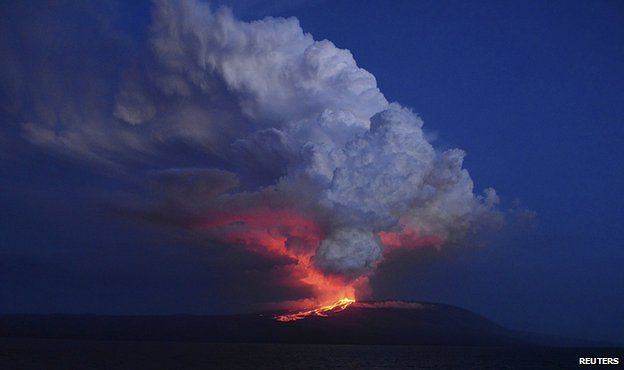Wolf volcano erupts on Galapagos island
- Published

A volcanic eruption on the Galapagos Islands has raised fears that the ecosystem that inspired Charles Darwin's theory of evolution may be under threat.
On Monday, the Wolf volcano on Isabela Island erupted for the first time in 33 years, spewing fire, smoke and lava.
Experts say the eruption poses no risk to people living on the island.
The island holds the world's only population of pink iguanas but they are not in immediate danger, officials say.
The Galapagos National park said that the lava was flowing in a south-westerly direction.
The iguanas, "which share the habitat with yellow iguanas and giant Chelonoidis becki tortoises, are situated on the north-west flank, which raises hopes that they will not be affected," it said in a statement.
The volcano lies on the northern tip of Isabela Island, the archipelago's largest.
It is 115km (70 miles) from Puerto Villamil, the only population centre on the island.
"The eruption generated a very large column of smoke that rose more than 10km (six miles) into the air, and later drifted toward the south-west part of the volcano," Sandro Vaca of Ecuador's Geophysics Institute told the AFP news agency.
The chain of 13 islands and 17 islets, which sits about 1,000km (621 miles) off the coast of Ecuador, is one of the most volcanically active regions in the world.
There are several varieties of iguanas on the islands.
Unesco has declared the Galapagos a World Heritage Site and has warned the ecosystem is in danger from increased tourism and the introduction of non-native species.
The variety of wildlife on the island famously inspired Charles Darwin to conceive the theory of evolution.
"One general law, leading to the advancement of all organic beings, namely, multiply, vary, let the strongest live and the weakest die," he wrote in On the Origin of Species after visiting the islands.
Related Topics
- Published22 September 2014
- Published13 September 2013